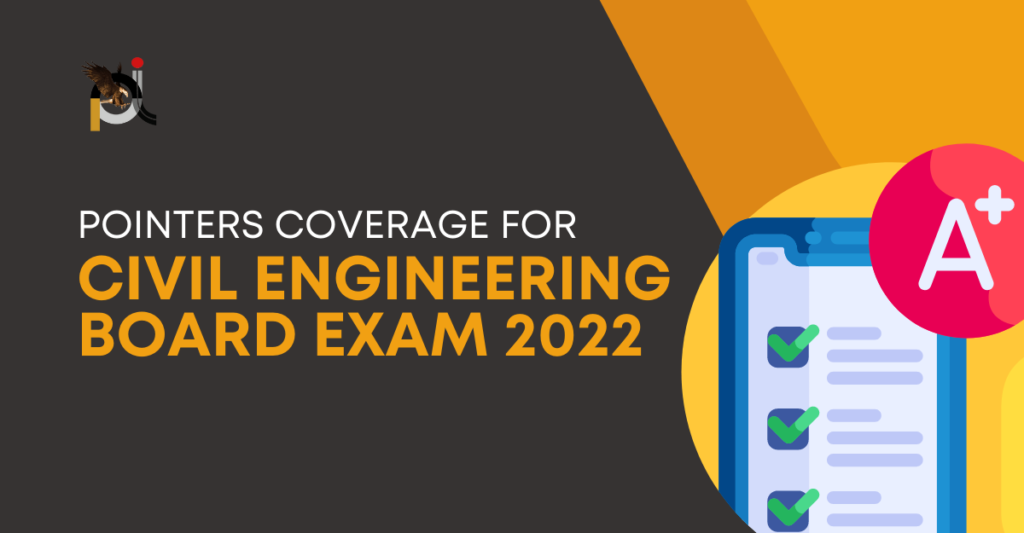The civil engineering board exam for this year 2022 is fast approaching on May 1st and 2nd. Every civil engineering graduate is preparing to review for the upcoming board examination. Padilla Review Center is ready to foster those who want to review for their civil engineering board examinations. We are ready to help students ace and master their board examinations. However, we will tackle the overview of what is the coverage of the civil engineering board examination.
Civil Engineering in the Philippines is a practice field wherein civil engineers are the ones who are responsible for giving services in various ways such as consultation, design, preparation, and implementation of plans, and supervising the building or demolitions of civil works like streets, buildings, bridges, etc. On the other hand, a civil engineer is a person who has licensed registers under the Board of Civil Engineers.
Scope of Civil Engineering Board Exam
An applicant must have a total general average of 70% with grades in every subject given on the examination not lower than 50% should be acquired such as:
Mathematics, Surveying, and Transportation Engineering (35%)
- Calculus
- Differential Equations
- Integral Calculus
- Different Equations
- First Order Differential Equation
- Higher-Order Differential Equations
- Engineering Data Analysis
- Numerical Methods
- Physics for Engineers
- Engineering Economy
- Present Economy Study
- Time-Value Relations
- Selection Among Alternatives: Present, Annual, and Future Worth; Internal and External Rate of Return Method
- Construction Surveying and Layout
- Material for Constructions
- Quantity Surveying
- Construction Occupational Safety and Health
- Transportation Engineering
- Highway Engineering
-Highway and Urban Transportation Planning and Economics
-Driver, Vehicle, Traffic, and Road Characteristics
-Highway Design
-Traffic Engineering and Highway Operations
-Road and Pavement Design
- Airport Engineering
- Ports and Harbors
- Bridges
- Construction Management Principles and Methods
- Engineering Relations and Ethics
- Contracts & Specifications
- Construction Project Organization
- Planning and Scheduling (PERT/CPM)
- Constructions Estimates
- Construction Methods & Operations
- Construction Equipment Operations and Maintenance
Hydraulics and Geotechnical Engineering (30%)
- Fluid Mechanics
- Properties of Fluids
- Hydrostatics
- Fluid Flow Concepts and Basic Equations
- Viscous Flow and Fluid Resistance
- Ideal Fluid Flow
- Steady Flow in Closed Conduits
- Steady Flow in Open Channels
- Buoyancy and Floatation
- Relative Equilibrium of Liquids
- Hydrodynamics
- Soil Mechanics and Foundation
- Soil Properties and Classification
- Fluid Flow through Soil Mass
- Soil Strength and Tests
- Stresses in Soil Mass
- Bearing Capacity
- Compaction
- Consolidation and Settlement
- Soil Improvement
- Lateral Earth Pressures
- Slope Stability
- Water Supply Soil Properties
Structural Engineering and Construction (35%)
- Engineering Mechanics
- Statics of Rigid Bodies
- Dynamics of Rigid Bodies
- Kinematics of Rigid Bodies
- Strength of Materials
- Reinforced Concrete Beams and Columns
- Steel Beams, Columns, Footings, and Connections
- Prestressed Concrete Beams
- Construction Materials Testing
- Application of the Governing Codes of Practice
So far these are the pointers for the civil engineering licensure exam. If you wish to have a nice place to review for the upcoming civil engineering licensure exam, Padilla Review Center is the one. Read our article about the Benefits of Enrolling in a Review Center and Its Importance. More informative articles about civil engineering are on our website here.
God speed to our future civil engineers! Padayon!

